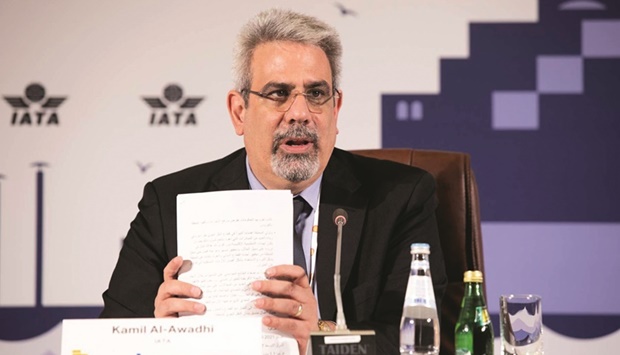IATA regional vice-president for Africa and Middle East Kamil Alawadhi has praised Qatar and the UAE for accommodating the concerns of the aviation industry, while placing restrictions at the height of the Covid-19 pandemic.
Speaking to reporters on the sidelines of the 78th IATA AGM and World Air Transport Summit in Doha on Sunday he said, “in Qatar aviation was a prominent member of the committee to tackle Covid-19 situation. Consequently, the decisions were made with aviation in mind.
“In many other countries in the region, decisions were not taken with a collaborative approach and aviation in mind. This has hugely impacted the aviation industry in the region. The rest of the countries should have looked at Qatar and the UAE and said this is how we should have done it,” Alawadhi noted.
Earlier making a presentation on regional aviation, Alawadhi said the Middle East is recovering and said the regional carriers are currently at 65% of the 2019 levels in terms of revenue passenger kilometres (RPKs), which is a “better” performance than in the previous quarter.
“The opening of the international markets, especially China for which Middle Eastern countries serve as hubs, facilitated the recovery and will drive further growth in RPKs,” Alawadhi said.
In terms of the ticket bookings, he said the first quarter of 2022 showed “some volatility” in the Middle East, oscillating between 73% to 80% of 2019 levels.
He said the Middle East is well on its way to reestablishing routes with the rest of the world. Connectivity between countries in the region have exceeded pre-pandemic levels as has connectivity between the region and North America.
As expected, connectivity between the region an Asia-Pacific remains depressed due to Covid restrictions in China.
In the Middle East, this year’s reopening of international routes and long-haul flights will provide a welcome boost for many.
Alawadhi said the region’s air cargo business is already operating at 18% above pre-Covid levels. Air cargo has been a lifeline for many, delivering vaccines, PPE, medical equipment and even e-commerce.
“In doing so, it has also been the revenue star for many airlines in the industry. The Region’s carriers, specifically, Qatar Airways, Emirates and Etihad played a critical role in the mammoth task by keeping flying throughout the crisis,” Alawadhi said.
He also called upon governments to work closely with the industry and with each other to drive a harmonised agenda for air transport in the region.
This, Alawadhi noted, will help the region better prepare for future crises that may impact aviation.
Speaking to reporters on the sidelines of the 78th IATA AGM and World Air Transport Summit in Doha on Sunday he said, “in Qatar aviation was a prominent member of the committee to tackle Covid-19 situation. Consequently, the decisions were made with aviation in mind.
“In many other countries in the region, decisions were not taken with a collaborative approach and aviation in mind. This has hugely impacted the aviation industry in the region. The rest of the countries should have looked at Qatar and the UAE and said this is how we should have done it,” Alawadhi noted.
Earlier making a presentation on regional aviation, Alawadhi said the Middle East is recovering and said the regional carriers are currently at 65% of the 2019 levels in terms of revenue passenger kilometres (RPKs), which is a “better” performance than in the previous quarter.
“The opening of the international markets, especially China for which Middle Eastern countries serve as hubs, facilitated the recovery and will drive further growth in RPKs,” Alawadhi said.
In terms of the ticket bookings, he said the first quarter of 2022 showed “some volatility” in the Middle East, oscillating between 73% to 80% of 2019 levels.
He said the Middle East is well on its way to reestablishing routes with the rest of the world. Connectivity between countries in the region have exceeded pre-pandemic levels as has connectivity between the region and North America.
As expected, connectivity between the region an Asia-Pacific remains depressed due to Covid restrictions in China.
In the Middle East, this year’s reopening of international routes and long-haul flights will provide a welcome boost for many.
Alawadhi said the region’s air cargo business is already operating at 18% above pre-Covid levels. Air cargo has been a lifeline for many, delivering vaccines, PPE, medical equipment and even e-commerce.
“In doing so, it has also been the revenue star for many airlines in the industry. The Region’s carriers, specifically, Qatar Airways, Emirates and Etihad played a critical role in the mammoth task by keeping flying throughout the crisis,” Alawadhi said.
He also called upon governments to work closely with the industry and with each other to drive a harmonised agenda for air transport in the region.
This, Alawadhi noted, will help the region better prepare for future crises that may impact aviation.


